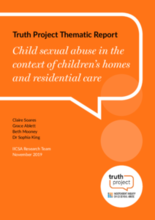Displaying 261 - 270 of 1087
The purpose of this study was to examine factors related to unintentional child injury requiring medical attention, including child welfare placement type, child behavioral problems, caregiver characteristics, and neighborhood factors.
Reflecting upon research on child neglect, this article focuses on the importance (or lack thereof) given to the views of families in neglect situation within this field.
This is a study on perceptions of child abuse and interventions in cases of abuse in the Family and Childhood Support Centres in Saint Petersburg, Russia.
This article draws from the authors’ experiences of implementing ecologically-based treatment models based on multisystemic therapy, including the Neighborhood Solutions Project (NS) and Multisystemic Therapy for Child Abuse and Neglect (MST-CAN). The authors call for a rigorous multisystemic approach to the protection of children, one that pays attention to children at risk of harm and those who are involved in formal child protection systems because they have experienced maltreatment.
This country care review includes the care related Concluding Observations adopted by the Committee on the Rights of Persons with Disabilities and the Committee on the Rights of the Child.
This is the second research publication in a series of thematic reports examining what victims and survivors have shared with the Truth Project about their experiences of child sexual abuse and the institutional context in which it occurred. It details the research findings in relation to experiences of child sexual abuse that occurred in the context of children’s homes and residential care in England and Wales.
This review aimed to compare child safety assessment instruments, which are used by child welfare professionals to determine whether a child is in immediate danger, and subsequently, whether immediate action is required to stop or prevent serious harm to the child.
In this study, the authors analyse a child protection services dataset that includes a network of approximately 5 million social relationships collected by social workers between 1996 and 2016 in New Zealand to test the potential of information about family networks to improve accuracy of models used to predict the risk of child maltreatment.
This study investigated the experiences and perception of parental neglect among independent child migrants (ICM) in Ghana and the relationship between these experiences and the children’s subjective well-being (happiness).
The current study examines the Mid-Adolescent Neglect Scale (MANS), a 45-item youth, self-reported measure of neglect.


